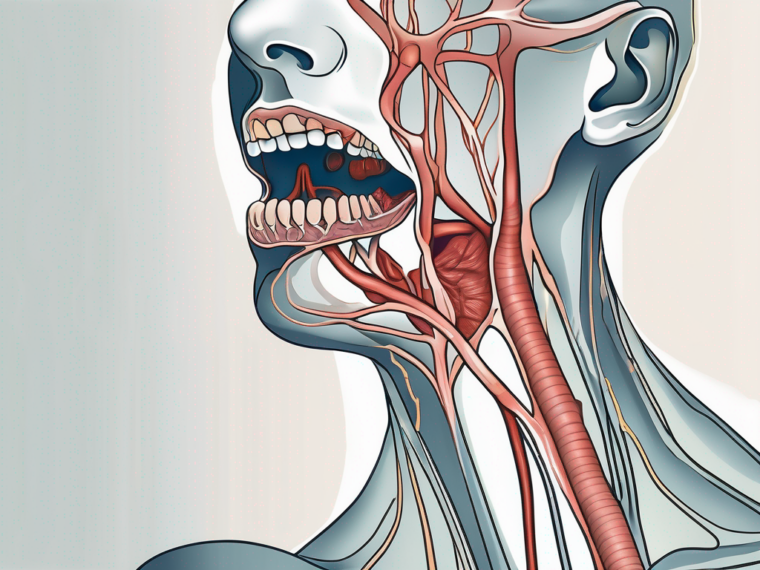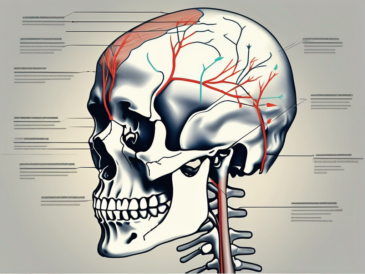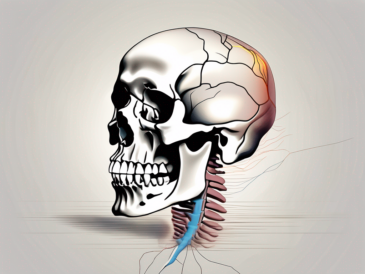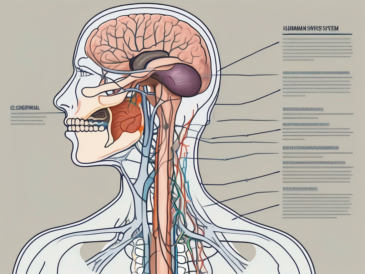The glossopharyngeal nerve, also known as cranial nerve IX, is one of the twelve cranial nerves in the human body. It plays a crucial role in various essential functions, ranging from basic sensory perception to complex motor activities. Understanding the anatomy and functions of the glossopharyngeal nerve is key to comprehending its significance in the body and identifying potential disorders that may arise.
Understanding the Glossopharyngeal Nerve
Anatomy of the Glossopharyngeal Nerve
The glossopharyngeal nerve, also known as cranial nerve IX, originates from the medulla oblongata, a vital structure located in the brainstem. It emerges from the posterior brainstem alongside other cranial nerves, including the vagus nerve and the accessory nerve. The glossopharyngeal nerve is a mixed cranial nerve, meaning it consists of both motor and sensory fibers.
The motor fibers of the glossopharyngeal nerve innervate specific muscles involved in swallowing and speech. These muscles include the stylopharyngeus muscle, which helps elevate the pharynx during swallowing, and the muscles of the tongue, which contribute to speech production. The sensory fibers of the glossopharyngeal nerve carry information from the back of the tongue, throat, and areas of the ear.
As the glossopharyngeal nerve travels through the head and neck, it gives off branches that supply sensation to various structures. These branches include the tympanic nerve, which provides sensory innervation to the middle ear, and the carotid sinus nerve, which senses changes in blood pressure. The complexity and importance of the glossopharyngeal nerve in regulating various bodily functions cannot be overstated.
Functions of the Glossopharyngeal Nerve
The glossopharyngeal nerve serves several crucial purposes, each contributing to the overall functioning of the body. One of its primary functions is the transmission of sensory signals, particularly taste perception, from the posterior third of the tongue to the brain. This enables us to experience the flavors of food and beverages, enhancing our overall enjoyment of eating and drinking.
In addition to taste perception, the glossopharyngeal nerve also plays a pivotal role in swallowing. It carries sensory information from the throat, allowing the brain to coordinate the intricate muscle movements necessary for safe and effective swallowing. Dysfunction of the glossopharyngeal nerve can lead to difficulties in swallowing, commonly referred to as dysphagia, which may require medical intervention to alleviate the associated symptoms.
Furthermore, the glossopharyngeal nerve contributes to the complex process of speech production. It provides sensory feedback from the muscles involved in speech, assisting in the coordination and refinement of articulation. A healthy glossopharyngeal nerve contributes to clear and precise speech, while any impairment may result in speech difficulties or alterations in voice quality.
Aside from its role in taste perception, swallowing, and speech production, the glossopharyngeal nerve also has autonomic functions. It helps regulate salivation, controlling the production and secretion of saliva. Additionally, it plays a role in monitoring blood pressure and heart rate through its connection to the carotid sinus, a baroreceptor located in the carotid artery.
Disorders affecting the glossopharyngeal nerve can manifest in various ways. Glossopharyngeal neuralgia, a condition characterized by severe pain in the throat, ear, and tongue, can be caused by irritation or compression of the nerve. Tumors, infections, or trauma to the head and neck region can also affect the function of the glossopharyngeal nerve, leading to a range of symptoms.
In conclusion, the glossopharyngeal nerve is a vital cranial nerve that plays a crucial role in taste perception, swallowing, speech production, and autonomic functions. Its complex anatomy and multifaceted functions highlight its importance in maintaining overall bodily function and quality of life.
The Role of the Glossopharyngeal Nerve in the Body
The glossopharyngeal nerve, also known as the ninth cranial nerve, is a crucial component of the human nervous system. It is responsible for a variety of functions that are essential for our daily lives. Let’s explore some of the key roles played by the glossopharyngeal nerve in the body.
The Glossopharyngeal Nerve and Taste
One of the primary functions of the glossopharyngeal nerve is its involvement in taste perception. Specifically, this nerve allows us to perceive taste in the posterior third of the tongue. Taste buds in this region are responsible for detecting flavors such as bitterness. When we consume food or drinks, the glossopharyngeal nerve transmits signals from these taste buds to the brain, enabling us to experience the diverse range of flavors that make up our culinary experiences.
Any disruptions to the glossopharyngeal nerve can affect our ability to appreciate certain tastes, potentially leading to a diminished enjoyment of specific food and drinks. For example, if the glossopharyngeal nerve is damaged or compromised, individuals may find it challenging to detect and appreciate the bitterness in foods like coffee or dark chocolate.
The Glossopharyngeal Nerve and Swallowing
Swallowing is a complex coordination of muscle contractions, allowing food and fluids to move from the mouth to the esophagus. The glossopharyngeal nerve plays a significant role in this process by transmitting sensory signals from the throat, prompting the appropriate muscle responses.
When we swallow, the glossopharyngeal nerve detects the presence of food or liquid in the throat and sends signals to the muscles involved in the swallowing process. These signals trigger a series of coordinated contractions that propel the food or liquid down the esophagus and into the stomach.
However, when the glossopharyngeal nerve is compromised or damaged, swallowing difficulties can arise. This can pose potential risks in nutrition and respiratory health. Individuals with glossopharyngeal nerve dysfunction may experience problems such as choking, aspiration, or inadequate intake of nutrients due to the inability to swallow effectively.
The Glossopharyngeal Nerve and Speech
Speech is a remarkably intricate process that involves precise movements of the tongue, lips, and vocal cords. The glossopharyngeal nerve provides sensory feedback necessary for monitoring and adjusting these movements, ensuring clear and intelligible speech.
When we speak, the glossopharyngeal nerve detects the position and movement of the tongue, allowing us to articulate sounds accurately. It also plays a role in controlling the muscles involved in voice production, helping us modulate pitch, volume, and tone.
Impairment of the glossopharyngeal nerve can result in speech abnormalities. Individuals with glossopharyngeal nerve damage may experience difficulties in pronouncing certain sounds, leading to slurred or nasally-sounding speech. This can have a significant impact on communication and may require speech therapy or other interventions to improve speech clarity.
In conclusion, the glossopharyngeal nerve plays a vital role in various essential functions of the body, including taste perception, swallowing, and speech. Any disruptions or damage to this nerve can have significant consequences on our ability to enjoy food, maintain proper nutrition, and communicate effectively. Understanding the importance of the glossopharyngeal nerve highlights the intricate nature of our nervous system and the remarkable coordination required for everyday activities.
Disorders Related to the Glossopharyngeal Nerve
The glossopharyngeal nerve is a crucial cranial nerve responsible for various functions in the throat, tongue, and ear. However, like any other nerve, it can be susceptible to disorders and damage. Understanding these conditions can help individuals seek appropriate medical attention and management.
Glossopharyngeal Neuralgia
Glossopharyngeal neuralgia is a rare condition that affects the glossopharyngeal nerve. This nerve irritation or compression leads to severe and recurrent bouts of pain in the throat, tongue, and ear. The pain experienced by individuals with glossopharyngeal neuralgia can be intense and debilitating, significantly impacting their quality of life.
If you suspect you may be experiencing glossopharyngeal neuralgia, it is essential to consult with a healthcare professional. They can provide an accurate diagnosis and offer appropriate treatment options tailored to your specific needs. Early intervention can help manage the pain and improve your overall well-being.
Damage to the Glossopharyngeal Nerve
The glossopharyngeal nerve can sustain damage due to various factors, including trauma, infection, or medical conditions like tumors or multiple sclerosis. When the glossopharyngeal nerve is damaged, it can lead to a range of symptoms that affect swallowing, speaking, taste perception, and throat pain.
If you are experiencing difficulty swallowing, speaking, or altered taste perception, it is crucial to consult with a healthcare professional. They can conduct a comprehensive evaluation to determine the underlying cause of your symptoms and develop an appropriate management plan. Early intervention and treatment can help alleviate discomfort and improve your ability to perform daily activities.
Treatment Options for Glossopharyngeal Nerve Disorders
Managing disorders related to the glossopharyngeal nerve often requires a multidisciplinary approach involving healthcare professionals from various specialties. The treatment options for glossopharyngeal neuralgia may include medication to alleviate pain, nerve blocks to provide temporary relief, or in severe cases, surgical intervention to address the underlying cause of the nerve compression.
On the other hand, managing glossopharyngeal nerve damage focuses on addressing the underlying cause. This may involve a combination of medications, therapy, and surgical intervention, depending on the specific circumstances. Consulting with a healthcare professional is crucial to determine the most suitable treatment plan for your individual needs.
Remember, early intervention and appropriate management can help improve your symptoms and overall quality of life. Do not hesitate to seek medical attention if you suspect any disorders related to the glossopharyngeal nerve.
The Glossopharyngeal Nerve and Medical Research
Recent Discoveries About the Glossopharyngeal Nerve
Ongoing medical research continues to shed light on the complex functions of the glossopharyngeal nerve and its involvement in various physiological processes. Recent studies have focused on unraveling the intricate neural pathways responsible for taste perception, swallowing coordination, and speech production. These findings contribute to our understanding of the glossopharyngeal nerve’s role in the body, potentially paving the way for improved diagnostic techniques and targeted treatments.
The glossopharyngeal nerve, also known as the ninth cranial nerve, is a mixed nerve that carries both sensory and motor information. It originates in the medulla oblongata, a region at the base of the brainstem, and extends down to the throat and tongue. This nerve plays a crucial role in transmitting signals related to taste, touch, and pain from the back of the tongue, tonsils, and throat to the brain. Additionally, it is involved in controlling the muscles responsible for swallowing and speech production.
Recent research has focused on understanding the neural pathways that allow the glossopharyngeal nerve to carry out its diverse functions. One study conducted on animal models revealed that taste perception involves a complex interplay between the glossopharyngeal nerve and other cranial nerves, such as the facial and vagus nerves. These findings highlight the intricate nature of taste perception and provide insights into potential therapeutic targets for taste-related disorders.
Another area of investigation has been the coordination of swallowing, which is essential for proper nutrition and overall health. Researchers have discovered that the glossopharyngeal nerve plays a crucial role in coordinating the muscles involved in swallowing, ensuring that the process is smooth and efficient. Dysfunction of this nerve can lead to difficulties in swallowing, known as dysphagia, which can have a significant impact on an individual’s quality of life. Understanding the neural mechanisms underlying swallowing coordination can help develop targeted interventions to improve swallowing function in patients with dysphagia.
Speech production, another complex process involving the coordination of various muscles and nerves, has also been a focus of recent research. The glossopharyngeal nerve contributes to the control of certain muscles involved in speech, such as those responsible for articulating specific sounds. By studying the neural pathways and mechanisms involved in speech production, researchers aim to gain a better understanding of speech-related disorders and develop more effective treatments.
Future Research Directions for the Glossopharyngeal Nerve
While significant progress has been made in understanding the glossopharyngeal nerve, many aspects of its functions and potential disorders remain unexplored. Future research endeavors aim to delve deeper into the intricacies of the glossopharyngeal nerve, unraveling its physiological mechanisms and potential therapeutic interventions. By continuing to expand our knowledge of the glossopharyngeal nerve, we can enhance our ability to diagnose, treat, and manage associated disorders, ultimately improving patient outcomes.
One area that requires further investigation is the role of the glossopharyngeal nerve in taste perception. Although we have gained valuable insights into the neural pathways involved, there is still much to learn about the specific taste receptors and their interactions with the glossopharyngeal nerve. Understanding these mechanisms could lead to the development of targeted therapies for taste disorders, such as ageusia or dysgeusia, where individuals experience a loss or alteration in their ability to taste.
Additionally, further research is needed to explore the potential therapeutic interventions for glossopharyngeal neuralgia, a condition characterized by severe pain in the throat, tongue, and ear. While current treatments focus on managing the symptoms, a deeper understanding of the underlying causes and mechanisms could lead to more effective and long-lasting relief for patients.
Furthermore, investigating the impact of glossopharyngeal nerve dysfunction on speech production and swallowing coordination can provide valuable insights into the development of targeted therapies for individuals with speech and swallowing disorders. By identifying the specific neural pathways involved and understanding how they contribute to these functions, researchers can develop interventions that address the root causes of these disorders, improving the quality of life for affected individuals.
In conclusion, the glossopharyngeal nerve assumes a vital role in the body’s sensory and motor functions. Its involvement in taste perception, swallowing coordination, and speech production underscores its significance in our everyday lives. Awareness of potential disorders related to the glossopharyngeal nerve, such as glossopharyngeal neuralgia and nerve damage, is crucial for timely diagnosis and appropriate management. If you experience any symptoms or concerns related to the glossopharyngeal nerve, it is essential to consult with a healthcare professional who can provide guidance and personalized care. Through ongoing medical research, we continue to expand our understanding of the glossopharyngeal nerve, paving the way for advances in diagnostics, treatments, and improved patient outcomes.




